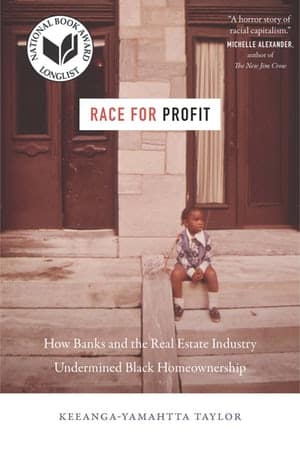Race for Profit: How Banks and the Real Estate Industry Undermined Black Homeownership
by Kathy Grear 11/11/2019LONGLISTED FOR THE 2019 NATIONAL BOOK AWARD
 By the late 1960s and early 1970s, reeling from a wave of urban uprisings, politicians finally worked to end the practice of redlining. Reasoning that the turbulence could be calmed by turning Black city-dwellers into homeowners, they passed the Housing and Urban Development Act of 1968, and set about establishing policies to induce mortgage lenders and the real estate industry to treat Black homebuyers equally. The disaster that ensued revealed that racist exclusion had not been eradicated, but rather transmuted into a new phenomenon of predatory inclusion.
By the late 1960s and early 1970s, reeling from a wave of urban uprisings, politicians finally worked to end the practice of redlining. Reasoning that the turbulence could be calmed by turning Black city-dwellers into homeowners, they passed the Housing and Urban Development Act of 1968, and set about establishing policies to induce mortgage lenders and the real estate industry to treat Black homebuyers equally. The disaster that ensued revealed that racist exclusion had not been eradicated, but rather transmuted into a new phenomenon of predatory inclusion.
Race for Profit uncovers how exploitative real estate practices continued well after housing discrimination was banned. The same racist structures and individuals remained intact after redlining’s end, and close relationships between regulators and the industry created incentives to ignore improprieties. Meanwhile, new policies meant to encourage low-income homeownership created new methods to exploit Black homeowners. The federal government guaranteed urban mortgages in an attempt to overcome resistance to lending to Black buyers – as if unprofitability, rather than racism, was the cause of housing segregation. Bankers, investors, and real estate agents took advantage of the perverse incentives, targeting the Black women most likely to fail to keep up their home payments and slip into foreclosure, multiplying their profits. As a result, by the end of the 1970s, the nation’s first programs to encourage Black homeownership ended with tens of thousands of foreclosures in Black communities across the country. The push to uplift Black homeownership had descended into a goldmine for realtors and mortgage lenders, and a ready-made cudgel for the champions of deregulation to wield against government intervention of any kind.
Narrating the story of a sea-change in housing policy and its dire impact on African Americans, Race for Profit reveals how the urban core was transformed into a new frontier of cynical extraction.
About the Author:
Keeanga-Yamahtta Taylor writes and speaks on Black politics, social movements, and racial inequality in the United States.

Keeanga-Yamahtta Taylor
She is author of From #BlackLivesMatter to Black Liberation, which won the Lannan Cultural Freedom Award for an Especially Notable Book in 2016. She is also editor of How We Get Free: Black Feminism and the Combahee River Collective, which won the Lambda Literary Award for LGBQT nonfiction in 2018.
Her third book, Race for Profit: How Banks and the Real Estate Industry Undermined Black Homeownership, published in 2019 by University of North Carolina Press, has been longlisted for a National Book Award for nonfiction.
Taylor’s writing has appeared in the New York Times, Los Angeles Times, Boston Review, Paris Review, Guardian, The Nation, Jacobin, and Souls: A Critical Journal of Black Politics, Culture, and Society, among others.
Taylor is a widely sought public speaker and writer. In 2016, she was named one of the hundred most influential African Americans in the United States by The Root. She has been appointed as a Distinguished Lecturer for the Organization of American Historians by the Organization of American Historians, and as the Charles H. McIlwain University Preceptor at Princeton University from 2018-2021.
She is Assistant Professor of African American Studies at Princeton University.
Reviews:
“The book makes a strong case that giving so much power to profit-driven industries doomed the program’s goals from the start, and there are clear parallels to the later subprime mortgage crisis of the 2000s. Race for Profit is an important addition to the literature on predatory lending and housing discrimination, as well as a valuable warning.”–Foreword Reviews
“Essential for readers wishing to understand the depth and differentials of U.S. racial discrimination, Taylor’s masterly exposé of the political economy of the racially bifurcated market systematically lays bare how residential segregation made profits from race; it also illustrates the mismatch of market solutions to racist policies and practices and underscores the limits of legislation alone to undo institutional racism.”–Library Journal, starred review
“Race for Profit powerfully disrupts a standard story about racism–that it depends on discriminatory exclusion–and introduces readers to ‘predatory inclusion,’ an analytical gift for students of social history. Through impressive research and vivid storytelling, Taylor offers an unflinching examination of the mythology that has sustained the American dream, ultimately revealing that, for many African Americans, homeownership hasn’t resulted in the fulfillment of a dream but instead has been a nightmare–a horror story of racial capitalism.”–Michelle Alexander, author of The New Jim Crow
“In Race for Profit, Keeanga-Yamahtta Taylor makes an enormous contribution to the collective understanding of the methods and mechanics of racial capitalism, revealing how the real estate industry’s long history of discrimination against African Americans has adapted from explicit policies of racist exclusion to equally devastating predatory financial mechanisms. Drawing on deep archival research, Taylor’s lucid and incisive book explains why we cannot look to the private sector for solutions, but instead need a radically different approach to housing based on the right to a dignified life for all.”—Naomi Klein, author of The Shock Doctrine
“This is an incredibly important history. Well-written, persuasive, and brimming with insightful analysis, Race for Profit is a book that people have been waiting for.”–Beryl Satter, author of Family Properties: How the Struggle over Race and Real Estate Transformed Chicago and Urban America
“Taylor offers a strong account of major transformations in U.S. affordable housing policy and its impact on African American communities. This is an extraordinary book, measured and incisive, with a rich and compelling narrative.”–Joseph Heathcott, The New School


